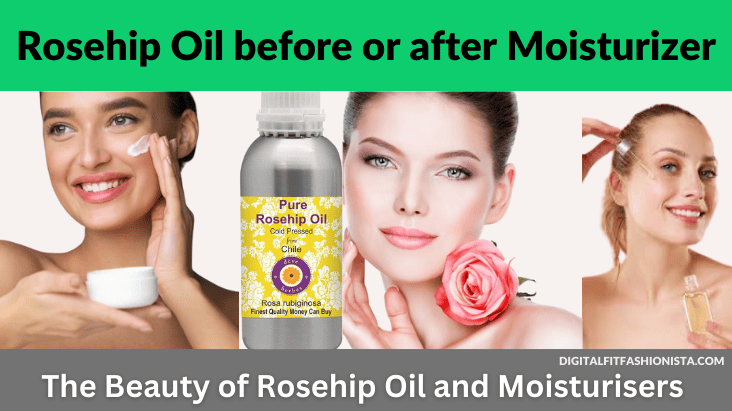Finding the proper order for applying your products can be the secret to maximizing your skin’s potential in the complex world of skincare.
Many people interested in beauty are unsure about the ongoing argument over whether to use Rosehip Oil before or after moisturizer. Discover the secret of using Rosehip Oil after moisturizer as we explore this skincare issue.
Rosehip Oil before or after Moisturizer
Imagine that each product in your skincare regimen is a step in a planned dance. Using Rosehip Oil after your moisturizer is similar to the conclusion of a concert in terms of application.
This strategy was chosen for the qualities of rosehip oil itself. Due to its rich makeup, rosehip oil has a deep, velvety texture.
The advantages of your prior skincare layers are sealed in by applying it on top of your moisturizer, creating a nourishing protective cocoon. So it will be better to apply Rosehip Oil after Moisturizer.
This two-layered technique seals in moisture strengthens the skin’s defenses, and creates a luxurious, cozy feeling. Scroll down to know in detail about the application of Rosehip oil, its benefits, and more.

What is Rosehip Oil?
One name is currently on everyone’s lips in the skincare industry: Rosehip oil. This priceless oil, which is made from the delicate fruits of roses, has a long history of use as a medicinal elixir, so its revival in the beauty industry is not by chance.
Rosehip Oil is enjoying its moment in the sun thanks to a variety of benefits, including hydration and acne-fighting ability.
The Beauty of Rosehip Oil and Moisturisers
After a hard day, moisturizers are like a cool drink for your skin. After cleansing and treatments, they restore the necessary oil and water balance your skin craves.
These moisturizing miracles typically have a lighter consistency and are designed to nourish your skin without becoming overpowering.
However, Rosehip Oil, which is made from the seeds of wild roses, has a unique set of advantages.
This oil is recognized for its ability to lock in moisture, strengthen the skin’s barrier function, and provide deep nourishment to dry skin types. It is rich in critical fatty acids, antioxidants, vitamins, and minerals.
From the above discussion, the query of Rosehip Oil before or after Moisturizer is clear.
The science behind Rosehip Oil
Rosehip oil’s botanical roots are what give it its unique qualities. This natural marvel is extracted from the tiny fruits that roses produce.
It has endured the test of time for its medicinal qualities. Science now supports its comeback in popularity, making it a crucial component of contemporary skincare regimens.
Maximizing the Potency of Rosehip Oil
Maximizing product absorption underlies the justification for applying Rosehip Oil after moisturizer. Moisturizers act as a foundation, laying the groundwork for subsequent treatments by combining water and oil.
Rosehip Oil is layered on top to strengthen the foundation and give your skin a potent elixir of necessary fatty acids.
Rosehip Oil is an excellent choice for the last phase because of its heavier consistency. Because of the way its molecules interact with moisturizers’ lighter texture, absorption is facilitated more effectively.
The advantages of both products are absorbed by your skin thanks to this synergy, giving you a complexion that glows with health and energy.
Rosehip Oil as Primer
While it is generally recommended to use Rosehip Oil first and then moisturizer, there are some situations when the reverse order may be more advantageous.
Some skincare enthusiasts apply Rosehip Oil as a pre-moisturizer before applying their moisturizer.
Rosehip Oil functions as a practical primer when used before moisturizer. It prepares your skin by supplying a concentrated burst of fatty acids, vitamins, and antioxidants.
This pre-treatment layer aids in more excellent product absorption, enabling your moisturizer to absorb fully and do its magic.
Rosehip Oil Benefits
Be prepared to be astounded by the numerous advantages Rosehip Oil bestows on your skin.
- Magical Anti-Inflammatory
Rosehip Oil has strong anti-inflammatory properties thanks to the presence of antioxidants, including polyphenols and anthocyanin. Eczema, psoriasis, and even acne are all frequently brought on by inflammation. You are armed with nature’s defense against redness and irritability when Rosehip Oil is on your side.
- Hydration Booster
Hydration is the most crucial factor in the pursuit of beautiful skin. With its extraordinary concentration of vital fatty acids, rosehip oil quickly penetrates the skin’s layers and infuses them with hydration. But it does more than that; it also strengthens cell walls, ensuring that moisture is retained. The outcome? is a defiantly radiant, supple complexion that defies monotony.

3. Plumping and Firming
The “building block of skin,” collagen, is frequently touted as being essential for preserving suppleness and firmness. Collagen production decreases with time, resulting in sagging skin. This is where rosehip oil excels since it is loaded with vitamin A, a supernutrient that prevents the degradation of collagen. Say goodbye to aging symptoms and hello to skin that is firmer and plumper.
- The Enemy of Acne
Rosehip oil’s antioxidants are powerful partners in the fight against acne. These antioxidants support the management of acne vulgaris by reducing edema and fluid retention. Utilise nature’s strength to eliminate those bothersome spots and reveal a brighter complexion.
- Texture Converter
An artisanal treatment for issues with skin texture is rosehip oil. Scars, fine lines, and wrinkles can be diminished because of their extraordinary healing qualities. Regular use will reveal a canvas that is both visually appealing and gentle to the touch.
6. Vitamin C and Rosehip Oil Make a Harmonious Couple
Absolutely! These two skincare giants are a perfect match for one another. Rosehip Oil’s vitamin A and vitamin C combine to produce extraordinary anti-aging properties.
Although this pair might be powerful, people with sensitive skin should continue with caution. Choose stable vitamin C products like Vitamin C Serum, which includes magnesium ascorbyl phosphate, instead.
7. Future Glowing with Rosehip Oil
The comeback of rosehip oil is not a fad. Instead, it is evidence of the extraordinary advantages it offers skin.
This botanical treasure is a flexible treatment for a variety of skin issues, from reducing inflammation to soothing thirst. Accept the age-old knowledge of Rosehip Oil and observe the transformation in your skin.
The conclusion is unambiguous for Rosehip Oil before or after Moisturizer
Rosehip Oil should be used in conjunction with a moisturizer. By combining the advantages of the two products, this method offers a beautiful experience that nourishes your skin from the inside out.
Customization is the essence of skincare, so feel free to test out both approaches and see which one best suits the requirements of your particular skin type.
Use Rosehip Oil as a moisturizer’s follow-up to unleash its full potential and watch your skincare regimen soar.
You’ll appreciate the wisdom in this methodical skincare routine as you bask in the glow of your bright face. This ritual honors the artistry of self-care.
So keep in mind that Rosehip Oil, a symphony of moisture, nourishment, and ageless beauty, comes after moisturizer.
FAQs: Rosehip Oil before or after Moisturizer
Should you combine vitamin C and rosehip oil?
Vitamin C and rosehip oil make a good skincare combo. Because vitamin C increases collagen production and rosehip oil nourishes.
What can you not mix with rosehip oil?
Avoid combining Rosehip oil with retinol or other powerful exfoliants. Because it may induce skin sensitivity
- Boho home decor living room - August 2, 2024
- What skincare routine is best for Combination skin - July 18, 2024
- Best Indoor Plants 2024 - June 29, 2024


